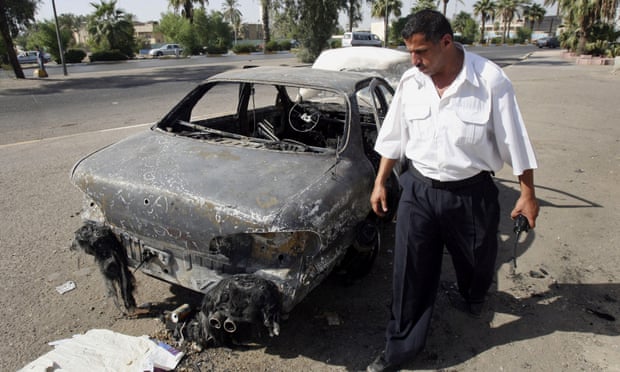The mass shooting in Baghdad for which Donald Trump pardoned four American mercenaries was “a massacre along the lines of My Lai in Vietnam”, the lead FBI investigator in the case said, pronouncing himself “disgusted with the president’s actions”.
Nicholas Slatten was convicted of first-degree murder and Paul Slough, Evan Liberty and Dustin Heard were convicted of voluntary and attempted manslaughter over the 2007 shooting, which happened in heavy traffic in Nisour Square.
Fourteen unarmed Iraqi civilians, among them a nine-year-old child, were killed when the mercenaries opened fire with weapons including machine guns and grenade launchers.
In a letter to the New York Times published on Friday, John M Patarini said: “I was the FBI case agent who led the investigation of the Blackwater massacre in Baghdad.
“We originally went to Iraq thinking this shooting was some form of innocent civilians caught in the crossfire between Blackwater guards and insurgents. After only one week, we determined that this incident was not as presented by Blackwater personnel and their state department lackeys, but it was a massacre along the lines of My Lai in Vietnam.”
The My Lai massacre took place on 16 March 1968. As many as 504 children, women and older men were killed by a US infantry company, members of which also raped numerous women and girls. Only William Calley, a lieutenant, was convicted of any crime. Sentenced to life, he served three days in prison before Richard Nixon ordered his sentence reduced.
In 2009, Calley said he felt “remorse for the Vietnamese who were killed, for their families, for the American soldiers involved and their families. I am very sorry.”
Trump, who will leave office on 20 January, has issued pardons or acts of clemency in cases in which US troops were accused or convicted of war crimes. Presidential pardons do not mean or imply innocence.
Patarini wrote that he “only recently became aware of the concerted effort for the pardons” of the four mercenaries who perpetrated the Nisour Square massacre, “which I understand started with a political push by members of Congress.
“President Trump should have had staff members review the trial evidence that led to the convictions and read the judges’ opinions and sentencing statements. God forbid they might have actually picked up the phone and called the investigators who built the case. I’m so disgusted with the president’s actions!”
After Trump issued the pardons, a lawyer for one of the mercenaries said: “Paul Slough and his colleagues didn’t deserve to spend one minute in prison. I am overwhelmed with emotion at this fantastic news.”
In an interview with the Associated Press (AP), published on Saturday, Liberty said he had been reading in his cell when a prison supervisor delivered the news.
“He says: ‘Are you ready for this?’” I said: ‘Uh, I’m not sure. What is going on?’ He said: ‘Presidential pardon. Pack your stuff.’”
Of his actions in Nisour Square, Liberty said: “I feel like I acted correctly. I regret any innocent loss of life, but I’m just confident in how I acted and I can basically feel peace with that.”
He also said he “didn’t shoot at anybody that wasn’t shooting at me” and said he and his fellow mercenaries would “never take an innocent life. We responded to a threat accordingly.”
That was not the finding of Patarini’s FBI investigation or the court in which the men were convicted. Internationally, Trump’s pardons have met with widespread condemnation. This week, the United Nations working group on the use of mercenaries called them “an affront to justice and to the victims of the Nisour Square massacre and their families”.
Patarini wrote that he had “spent many hours with the innocent Iraqi victims who are permanently maimed and crippled because of the actions of these Blackwater guards, and the heartbroken family members of those killed.
“I am embarrassed for our country. I believe we will pay a heavy price in our relationships with other countries as a result of these pardons.”
Liberty told the AP he was grateful to his supporters and to Trump for what he called a “second chance at life”, and said he felt “like it’s my duty to go out and do something positive and live a good life because they gave me a second chance”.
After the pardons were announced, Adil al-Khazali, an Iraqi citizen whose father, Ali, was killed in Nisour Square, told the Guardian: “Justice doesn’t exist.
“I ask the American people to stand with us. I lost my father and many innocent women and children also died. I ask the US government to reconsider, because by this decision US courts are losing their reputation. Trump has no right to pardon killers of innocent people.”
Source (Click Here)


 RSS Feed
RSS Feed